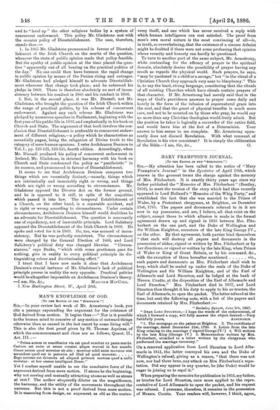MAN'S KNOWLEDGE OF GOD.
ITo THE EDITOR OF THE " SPECTATOR:1
Sift,—In your review last week of Mr. Armstrong's book, you cite a passage expounding the argument for the existence of God derived from motion. It begins thus :—" Nor is it possible to the human mind to conceive of any motion of outward things otherwise than as caused in the last resort by some living will." This is also the first proof given by St. Thomas Aquinas, of
which the commencement and close are as follows, QIMOSt.. II , Art. III. :— " Prima autem et manifeatior via est clued sumitur ex parte motda.
Certain est enim et sense constet aliqua maveri in hoc mundo Omno autem quod movetur ab alio ; movetur nihil enim movetnr nisi seoundum quod est in potentia ad Bind ad quod movetnr Ergo necesse eat devenire ad aliquod primum mover's quad a nnllo movetur : at hoc omnes intelligunt Deum."
Yet I confess myself unable to see the conclusive force of the argument derived from mere motion. If atoms be the beginning, why not moving and mutually attracting atoms as well as atoms at rest P The author eloquently dilates on the magnificence, the harmony, and the utility of the movements throughout the universe. But this is not a proof derived from mere motion. It is reasoning from design, an argument as old as the contro-
versy itself, and one which has never received a reply with which human intelligence can rest satisfied. The proof from man's own moral nature is the most convincing of all—is, in truth, so overwhelming, that the existence of a sincere Atheist might be doubted if there were not some professing that opinion whose veracity and honesty can hardly be questioned.
To turn to another part of the same subject, Mr. Armstrong, while contending for the efficacy of prayer in the spiritual. domain, absolutely denies the possibility of prayer having any result as regards the physical world. Such prayers, he says, "may be pardoned in a child or a savage," but " in the ritual of a Christian Church they approach very near to blasphemy." This is, to say the least, strong language, considering that the rituals of all existing Churches which have rituals contain prayers of that character. If Mr. Armstrong had merely said that in the ways of God's providence answers to prayer come daily and hourly in the form of the infusion of supernatural grace into the soul, and that the grant of physical benefits is much more tare, and not to be counted on by those who pray, he would say no more than any Christian theologian would freely admit. But the position he takes is logically a surrender of the entire field, and would leave him at the feet of a Determinist. Your answer to him seems to me complete. Mr. Armstrong appa- rently does not discard Revelation. With what remnant of Revelation is his view consistent F It is simply the obliteration.


































 Previous page
Previous page